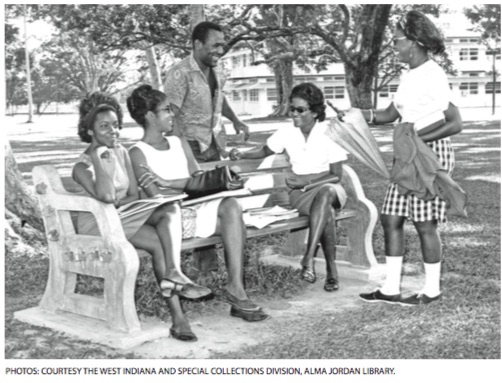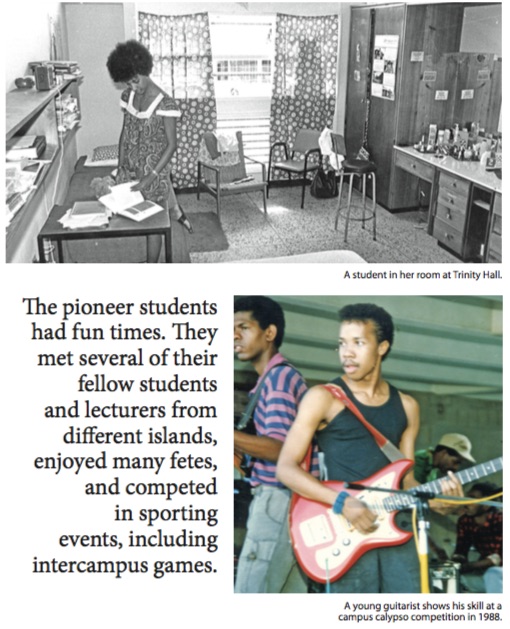
St Augustine’s pioneer students share their story and advice on the campus experience
“There is a strong camaraderie among us that has lasted for a lifetime,” Mr Ramganie “Bob” Gopee says while looking back at his relationships with UWI St Augustine that began 60 years ago. The campus welcomed its first batch of engineering and agriculture students in 1960, then some 12 students studying Arts and Science three years later.
Since those earliest days, UWI St Augustine has emerged as a dynamic campus, a crucial component of a regional institution of higher education that has helped shape Caribbean society through its scholarship, thought leadership, and the training and enlightenment of several generations of academics, artists, activists, professionals and political leaders.
But as a fledgling campus in the early 1960s, it first had to attract students willing to make a life investment in its programmes. They did so, many driven by the need for an affordable education.
“It was expected that those who went on to attain a higher certificate would go on to University. Most of us couldn’t afford to study abroad, so we went to UWI St Augustine,” says Mrs Lyris Hodge-Christian, who enrolled in 1965 to do a degree in languages.
Very quickly, the campus was seen as a viable option for higher academia, for national, regional and international students. “I got the British Guiana Government exhibition scholarship in 1962 to study Civil Engineering,” Mr Cecil Chin states. He was one of two Guyanese who came over that year to be enrolled as the first batch of engineering degree students.
Campus in the 60's was eventful, and the students had exciting experiences as they navigated life as newcomers. Even with so few students, space was sometimes scarce. Mr Gopee remembers once, his lecturer booked a class in the Arcon Building, and another lecturer showed up who had booked the class as well. “They kicked us out!” he laughs. “We ended up having class under a tree!”
“The campus was smaller, safer and friendlier. Lecturers knew us personally,” Mrs Hodge-Christian remembers. “I saw a lecturer years after, Dr Roy Thomas, and even then he remembered me.”

Hall life was a highlight of those days. Milner Hall (now Freedom Hall) was the very first hall of residence on campus, but Dr Edward Cazabon was one of the first students assigned to the newly built Canada Hall.
“We had to walk all the way from Canada Hall to Milner Hall for meals,” he recalls. Mr Chin agrees, adding, “we used the old British system. We had lectures in the morning, lunch on halls, tutorials after lunch, and then afternoon tea. Dinner time was at 7pm, plus a formal dinner every week.”
Not all students could afford to stay on a hall of residence, so they would share apartments close by the campus. Challenges such as financing, boarding and even academics, however, didn’t seem insurmountable. As Mrs Hodge-Christian puts it, as “firsts” there was nothing to compare it to: “some things weren’t the most comfortable but no one complained because at the time were not considered challenges.”
The pioneer students had fun times. They met several of their fellow students and lecturers from different islands, enjoyed many fetes, and competed in sporting events, including intercampus games. In 1965, Mr Chin represented the UWI St Augustine table tennis team at the intercampus games held in Jamaica.
He excitedly recalls visiting Tobago in his second year for Survey Camp. The Thursday of that week, Tobago was struck by Hurricane Flora. “There was no satellite to warn us! We just felt the breeze, and saw the branch of a coconut tree touching the ground on its left,” he recalls. “Then there was a lull, which we now know is the eye, and the wind started again, and the tree was now touching the ground to its right. Suddenly, we were no longer in the dark, because the roof flew off!”
For the early students, the beauty of the campus was really in the relationships they formed. Mrs Hodge–Christian says, “There was the syncing of ideas, deep discussions and helping each other with studies.” She gushed, “a good experience for me was being able to experience different cultures!”
60 years later, these alums look forward to liming at Mr Gopee's house. “We still keep in touch. We have a Yahoo group where we catch up and we have a party around Christmas or New Years’ time up by Bob Gopee's house every year”, Mr Chin revealed. The highly anticipated party may not occur this year because of COVID-19 and the pandemic protocols.

Mr Gopee, 81, is started at UWI in 1963, studying economics and sociology.” After graduation though, he went to London to be trained in accountancy. Now he is a consulting partner in his accounting firm.
Similarly, Mrs Hodge-Christian joined the Faculty of Arts and Science after obtaining her higher certificate. She couldn’t afford to go abroad but university was the expected path for those pursuing careers, and all her friends went in a similar direction. She is from a family of six siblings, five girls and one boy. Now in her late 70's, she enjoys retirement, but she had a long career in teaching languages, training public service professionals and human resources.
“I have no children of my own, but I have many nieces and nephews,” she boasts.
Dr Cazabon and Mr Chin's journeys were somewhat different from the norm. Mr Cazabon, 84, left St Mary's College in 1954 and started working at the Port of Spain Hospital as a medical lab technologist. He got married in 1958 and had two daughters. Thereafter, higher education in Trinidad opened up under the leadership of then Prime Minister and leader of the People’s National Movement, Dr Eric Williams. In 1961, Cazabon applied for a scholarship in surveying but was successful with a scholarship in agriculture, specifically, animal production. After his first degree, he received another scholarship to do veterinary medicine, then specialised in Veterinary Comparative Pathology in Canada from 1967 to 1971.
“I headed the Ministry of Agriculture Veterinary Lab and ran the Pathology Department in Mt Hope. I eventually resigned from Government, while lecturing at The UWI and COSTAATT which I did until my retirement in 2019,” he says.
77-year-old Mr Chin, whose parents emigrated from China to Guyana, is the fourth of five boys and a sister. His grandfather, father and uncle left China to seek better opportunities. His sister remained in China with her cousins, but all the brothers grew up in Guyana. After his degree in civil engineering, he attained a post graduate diploma in Canada on a UNESCO scholarship. He returned to work with a Dutch-owned company, Trinidad Contractors, and travelled all around the Caribbean working on projects. He moved on to a career at the Caribbean Industrial Research Institute (CARIRI) located on the St Augustine Campus.
“I eventually started doing my own consulting, but I always remembered travelling to the other islands for work and connecting with my UWI colleagues,” he says.
When asked about his thoughts about the campus, Mr Gopee says, “it is a necessary institution that has allowed the level of education in Trinidad to be lifted. It has tremendous history, infrastructure and culture; it’s an excellent academic institution with the best research, especially in tropical agriculture.”
Dr Cazabon says the campus allowed many people who couldn’t afford university to attend and now it is a standard in the Caribbean.
“The UWI produced a cadre of administrators, professionals and politicians in Trinidad and Tobago and the Caribbean. It benefitted international societies as well”, Mr Chin says.
To students, the pioneers advise, “this is the time of your life, make meaningful connections; study hard, don’t waste time and don’t waste opportunities; focus on what’s in front of you. The temptations and distractions are high and wide and there’s a high chance of getting a mediocre degree. We have too many generalists and right now we need specialists.”
Mrs Hodge-Christian profoundly says, “do your best because the world will create enormous challenges. Increase your awareness, opportunities and relationships, deal with the challenges and make yourself strong. Go for it!”